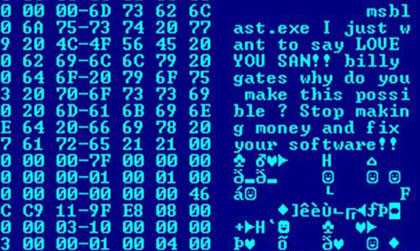|
Spy Wiper
Spy Wiper, also known as Mail Wiper and Spy Deleter, is a malware program that was fraudulently sold as an antispyware program. In 2005, the Federal Trade Commission filed a civil suit against the companies Seismic Entertainment Productions, MailWiper Inc., and Spy Deleter Inc. The suit alleged the three companies illegally sold the fraudulent malware program, receiving over $2 million in revenue. References Further reading * * * See also *Rogue software Rogue security software is a form of malicious software and internet fraud that misleads users into believing there is a virus on their computer and aims to convince them to pay for a fake malware removal tool that actually installs malware on ... Rogue security software {{Malware-stub ... [...More Info...] [...Related Items...] OR: [Wikipedia] [Google] [Baidu] |
Malware
Malware (a portmanteau for ''malicious software'') is any software intentionally designed to cause disruption to a computer, server, client, or computer network, leak private information, gain unauthorized access to information or systems, deprive access to information, or which unknowingly interferes with the user's computer security and privacy. By contrast, software that causes harm due to some deficiency is typically described as a software bug. Malware poses serious problems to individuals and businesses on the Internet. According to Symantec's 2018 Internet Security Threat Report (ISTR), malware variants number has increased to 669,947,865 in 2017, which is twice as many malware variants as in 2016. Cybercrime, which includes malware attacks as well as other crimes committed by computer, was predicted to cost the world economy $6 trillion USD in 2021, and is increasing at a rate of 15% per year. Many types of malware exist, including computer viruses, worms, Trojan horses, ... [...More Info...] [...Related Items...] OR: [Wikipedia] [Google] [Baidu] |
Rogue Security Software
Rogue security software is a form of malicious software and internet fraud that misleads users into believing there is a virus on their computer and aims to convince them to pay for a fake malware removal tool that actually installs malware on their computer. It is a form of scareware that manipulates users through fear, and a form of ransomware. Rogue security software has been a serious security threat in desktop computing since 2008. An early example that gained infamy was SpySheriff and its clones. Propagation Rogue security software mainly relies on social engineering ( fraud) to defeat the security built into modern operating system and browser software and install itself onto victims' computers. A website may, for example, display a fictitious warning dialog stating that someone's machine is infected with a computer virus, and encourage them through manipulation to install or purchase scareware in the belief that they are purchasing genuine antivirus software. Mo ... [...More Info...] [...Related Items...] OR: [Wikipedia] [Google] [Baidu] |
Antispyware
Spyware (a portmanteau for spying software) is software with malicious behaviour that aims to gather information about a person or organization and send it to another entity in a way that harms the user—for example, by violating their privacy or endangering their device's security. This behaviour may be present in malware as well as in legitimate software. Websites may engage in spyware behaviours like web tracking. Hardware devices may also be affected. Spyware is frequently associated with advertising and involves many of the same issues. Because these behaviors are so common, and can have non-harmful uses, providing a precise definition of spyware is a difficult task.FTC Report (2005)." History The first recorded use of the term :wikt:spyware, spyware occurred on October 16, 1995 in a Usenet post that poked fun at Microsoft's business model.Vossen, Roland (attributed); October 21, 1995Win 95 Source code in c!!posted to rec..programmer; retrieved from groups.google.com ... [...More Info...] [...Related Items...] OR: [Wikipedia] [Google] [Baidu] |
Federal Trade Commission
The Federal Trade Commission (FTC) is an independent agency of the United States government whose principal mission is the enforcement of civil (non-criminal) antitrust law and the promotion of consumer protection. The FTC shares jurisdiction over federal civil antitrust enforcement with the Department of Justice Antitrust Division. The agency is headquartered in the Federal Trade Commission Building in Washington, DC. The FTC was established in 1914 with the passage of the Federal Trade Commission Act, signed in response to the 19th-century monopolistic trust crisis. Since its inception, the FTC has enforced the provisions of the Clayton Act, a key antitrust statute, as well as the provisions of the FTC Act, et seq. Over time, the FTC has been delegated with the enforcement of additional business regulation statutes and has promulgated a number of regulations (codified in Title 16 of the Code of Federal Regulations). The broad statutory authority granted to the FTC provide ... [...More Info...] [...Related Items...] OR: [Wikipedia] [Google] [Baidu] |
Center For Democracy And Technology
Centre for Democracy & Technology (CDT) is a Washington, D.C.-based 501(c)(3) nonprofit organisation that advocates for digital rights and freedom of expression. CDT seeks to promote legislation that enables individuals to use the internet for purposes of well-intent, while at the same time reducing it's potential for harm. It advocates for transparency, accountability, and limiting the collection of personal information. The CDT seeks to mitigate online media censorship, enable individuals to access information freely without retaliation or punishment, and encourages consensus among all parties interested in the future of the Internet. The CDT acts as a non-partisan body, drawing together perspectives from varying backgrounds to emphasize the importance of technology's role in the freedom, expression, security, privacy, and integrity of the individual. It advises government officials, agencies, corporations, and civil society. In addition to its office in Washington, D.C., the C ... [...More Info...] [...Related Items...] OR: [Wikipedia] [Google] [Baidu] |
CNET
''CNET'' (short for "Computer Network") is an American media website that publishes reviews, news, articles, blogs, podcasts, and videos on technology and consumer electronics globally. ''CNET'' originally produced content for radio and television in addition to its website and now uses new media distribution methods through its Internet television network, CNET Video, and its podcast and blog networks. Founded in 1994 by Halsey Minor and Shelby Bonnie, it was the flagship brand of CNET Networks and became a brand of CBS Interactive through that unit's acquisition of CNET Networks in 2008. It has been owned by Red Ventures since October 30, 2020. Other than English, ''CNETs region- and language-specific editions include Chinese, French, German, Japanese, Korean, and Spanish. History Origins After leaving PepsiCo, Halsey Minor and Shelby Bonnie launched ''CNET'' in 1994, after website Yahoo! was launched. With help from Fox Network co-founder Kevin Wendle and forme ... [...More Info...] [...Related Items...] OR: [Wikipedia] [Google] [Baidu] |
The Herald (Everett)
''The Everett Herald'' is a daily newspaper based in Everett, Washington, United States. It is owned by Sound Publishing, Inc. The paper serves residents of Snohomish County. History ''The Daily Herald'' was first published on February 11, 1901, by S. A. Perkins and S. E. Wharton. An earlier newspaper known as the ''Herald'' had been established in 1891 and ceased publication during the Panic of 1893. The second incarnation of the ''Herald'', originally named the ''Everett Independent'', was sold to James B. Best in 1905. The newspaper established a satellite news bureau for southern Snohomish County in May 1954, which later became the ''Western Sun'' edition in 1970. The ''Herald'' moved its offices and printing presses to a building on California Street in 1959. The Best family owned the newspaper until it was sold in 1978 to the Washington Post Company. On April 5, 1981, the ''Herald'' published its first Sunday edition and folded the ''Western Sun'' edition into the countyw ... [...More Info...] [...Related Items...] OR: [Wikipedia] [Google] [Baidu] |
Creative Loafing
Creative Loafing is an Atlanta-based publisher of a monthly arts and culture newspaper/magazine. The company publishes a 60,000 circulation monthly publication which is distributed to in-town locations and neighborhoods on the first Thursday of each month. The company has historically been a part of the alternative weekly newspapers association in the United States. Creative Loafing began as a family-owned business in 1972 by Deborah and Chick Eason, expanding to other cities in the Southern United States in the late 1980s and 1990s. In 2007 it doubled its circulation with the purchase of the ''Chicago Reader'' and ''Washington City Paper''; the $40 million debt it incurred, along with an economic recession, forced the company into bankruptcy one year later. The parent company, Creative Loafing, Inc. was dissolved and Atalaya sold off the ''Chicago Reader''. In 2012, SouthComm purchased all of the properties and then sold off each of the papers to other publishers in 2018. The A ... [...More Info...] [...Related Items...] OR: [Wikipedia] [Google] [Baidu] |
Rogue Software
Rogue security software is a form of malicious software and internet fraud that misleads users into believing there is a virus on their computer and aims to convince them to pay for a fake malware removal tool that actually installs malware on their computer. It is a form of scareware that manipulates users through fear, and a form of ransomware. Rogue security software has been a serious security threat in desktop computing since 2008. An early example that gained infamy was SpySheriff and its clones. Propagation Rogue security software mainly relies on social engineering (fraud) to defeat the security built into modern operating system and browser software and install itself onto victims' computers. A website may, for example, display a fictitious warning dialog stating that someone's machine is infected with a computer virus, and encourage them through manipulation to install or purchase scareware in the belief that they are purchasing genuine antivirus software. Most h ... [...More Info...] [...Related Items...] OR: [Wikipedia] [Google] [Baidu] |

.jpg)

